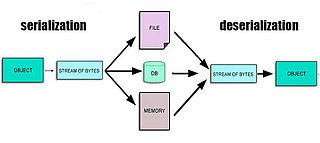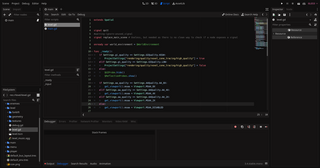
Common Lisp (CL) is a dialect of the Lisp programming language, published in American National Standards Institute (ANSI) standard document ANSI INCITS 226-1994 (S2018). The Common Lisp HyperSpec, a hyperlinked HTML version, has been derived from the ANSI Common Lisp standard.

Emacs Lisp is a Lisp dialect made for Emacs. It is used for implementing most of the editing functionality built into Emacs, the remainder being written in C, as is the Lisp interpreter.
In computer science, functional programming is a programming paradigm where programs are constructed by applying and composing functions. It is a declarative programming paradigm in which function definitions are trees of expressions that map values to other values, rather than a sequence of imperative statements which update the running state of the program.

Lisp is a family of programming languages with a long history and a distinctive, fully parenthesized prefix notation. Originally specified in the late 1950s, it is the second-oldest high-level programming language still in common use, after Fortran. Lisp has changed since its early days, and many dialects have existed over its history. Today, the best-known general-purpose Lisp dialects are Common Lisp, Scheme, Racket, and Clojure.

In computing, serialization is the process of translating a data structure or object state into a format that can be stored or transmitted and reconstructed later. When the resulting series of bits is reread according to the serialization format, it can be used to create a semantically identical clone of the original object. For many complex objects, such as those that make extensive use of references, this process is not straightforward. Serialization of objects does not include any of their associated methods with which they were previously linked.
In a computer language, a reserved word is a word that cannot be used as an identifier, such as the name of a variable, function, or label – it is "reserved from use". This is a syntactic definition, and a reserved word may have no user-defined meaning.
In computer programming, the scope of a name binding is the part of a program where the name binding is valid; that is, where the name can be used to refer to the entity. In other parts of the program, the name may refer to a different entity, or to nothing at all. Scope helps prevent name collisions by allowing the same name to refer to different objects – as long as the names have separate scopes. The scope of a name binding is also known as the visibility of an entity, particularly in older or more technical literature—this is in relation to the referenced entity, not the referencing name.
Bytecode is a form of instruction set designed for efficient execution by a software interpreter. Unlike human-readable source code, bytecodes are compact numeric codes, constants, and references that encode the result of compiler parsing and performing semantic analysis of things like type, scope, and nesting depths of program objects.
CMUCL is a free Common Lisp implementation, originally developed at Carnegie Mellon University.
The GNU Scientific Library is a software library for numerical computations in applied mathematics and science. The GSL is written in C; wrappers are available for other programming languages. The GSL is part of the GNU Project and is distributed under the GNU General Public License.
In computer science, a programming language is said to have first-class functions if it treats functions as first-class citizens. This means the language supports passing functions as arguments to other functions, returning them as the values from other functions, and assigning them to variables or storing them in data structures. Some programming language theorists require support for anonymous functions as well. In languages with first-class functions, the names of functions do not have any special status; they are treated like ordinary variables with a function type. The term was coined by Christopher Strachey in the context of "functions as first-class citizens" in the mid-1960s.
In programming and software design, a binding is an application programming interface (API) that provides glue code specifically made to allow a programming language to use a foreign library or operating system service.

In computer science, the syntax of a computer language is the rules that define the combinations of symbols that are considered to be correctly structured statements or expressions in that language. This applies both to programming languages, where the document represents source code, and to markup languages, where the document represents data.
A foreign function interface (FFI) is a mechanism by which a program written in one programming language can call routines or make use of services written or compiled in another one. An FFI is often used in contexts where calls are made into a binary dynamic-link library.
In programming, a docstring is a string literal specified in source code that is used, like a comment, to document a specific segment of code. Unlike conventional source code comments, or even specifically formatted comments like docblocks, docstrings are not stripped from the source tree when it is parsed and are retained throughout the runtime of the program. This allows the programmer to inspect these comments at run time, for instance as an interactive help system, or as metadata.
In functional programming, filter is a higher-order function that processes a data structure in some order to produce a new data structure containing exactly those elements of the original data structure for which a given predicate returns the boolean value true.
libffi is a foreign function interface library. It provides a C programming language interface for calling natively compiled functions given information about the target function at run time instead of compile time. It also implements the opposite functionality: libffi can produce a pointer to a function that can accept and decode any combination of arguments defined at run time.

In computing, a script is a relatively short and simple set of instructions that typically automate an otherwise manual process. The act of writing a script is called scripting. Scripting language or script language describes a programming language that is used for scripting.




